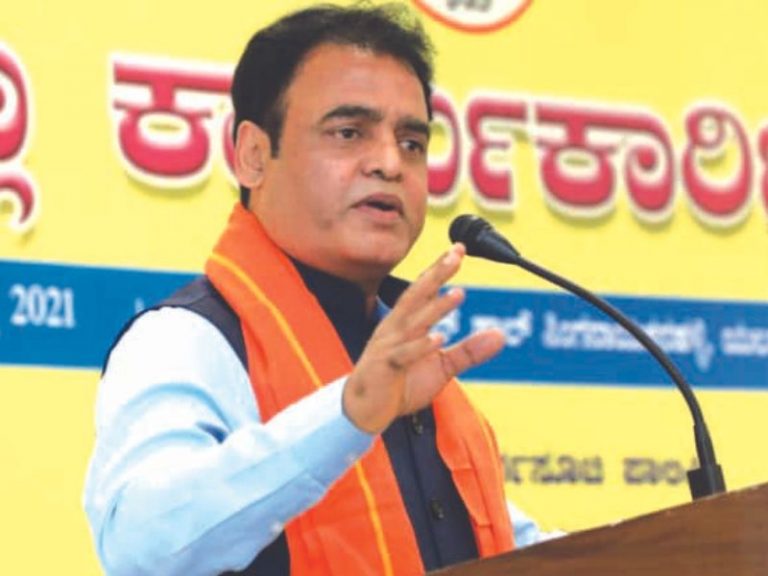Karnataka: Anaemic education initiative
Reshma Ravishanker (Bengaluru)

Ashwath Narayan:
Reeling under attacks from the opposition Congress party which has launched a highly effective ‘Pay CM — 40 percent accepted here’ poster campaign across the state to highlight rampant corruption in the state (last November the Karnataka State Contractors’ Association wrote directly to prime minister Narendra Modi complaining that government officials routinely extort 40 percent ‘commission’ on all government contracts and bills payable) and also accused by several private schools associations of pervasive corruption, Karnataka’s BJP government has sought to recover lost ground by announcing a slew of education initiatives.
On September 20, the state government tabled the State Universities (Amendment) Bill 2022, which proposes promotion of eight state government universities in Bidar, Haveri, Kodagu, Chamarajanagar, Hassan, Koppal, Mandya and Bagalkot districts. The estimated expenditure: Rs.112 crore over the next two years.
Moreover the BJP government’s populist statements of intent to reserve 75 percent of employment in government and private sector industry for natives of the state and making Kannada the sole language of administration are also being interpreted as desperate measures of the besieged BJP government readying for legislative assembly elections early next year.
Opposition Congress party leaders and academics have been quick to highlight that Karnataka already hosts 33 state universities beset with massive faculty shortages, rampant corruption in appointment of vice chancellors and faculty, obsolete curriculums and pedagogies and poor infrastructure. Consequently, admissions in government undergrad degree colleges affiliated with state-run universities are plummeting.
According to a report in The Hindu (September 30) 171 government degree colleges affiliated with state universities received less than 100 admission applications for the new academic year 2022-23, with three colleges reporting single digit admissions against 740 vacancies. Moreover, with the state’s BJP government being first off the blocks to implement the National Education Policy (NEP) 2020 in higher education institutions, university managements are confused and apprehensive about online admissions, teaching engineering programmes in Kannada etc.
Simultaneously, Krishna Byre Gowda, a Congress party leader, has alleged “several irregularities and scams” in the appointment of vice chancellors and faculty at state universities, and rampant corruption that has resulted in “deterioration of higher education standards”. Moreover Congress state president Eshwar Khandre has accused the BJP government of auctioning posts of vice chancellors for Rs.5-20 crore.
Confronted with a barrage of criticism, higher education minister Dr. C.N. Ashwath Narayan admitted that 2,300 faculty positions are vacant in the state’s government colleges and varsities. Vice chancellors posts are also vacant in three varsities for over a year — in Gulbarga (Kalaburagi), Karnataka Folklore (Haveri) and Karnatak universities.
With Karnataka’s extant 33 universities and hundreds of affiliated colleges in a shambles and beset with funding, faculty and certification credibility problems, respected academics question the advisability of augmenting the number of new under-resourced universities dispensing poor quality education.
“The government should distribute available resources to strengthen existing state universities instead of promoting anaemic new higher education institutions. It should use the finances allocated to raise education standards, recruit qualified faculty and focus on research and development in existing higher education institutions which need immediate upgradation. A new vision document to transform and upgrade its public universities to global standards is the pressing need. New universities can wait,” says Dr. A.S. Seetharamu, former professor of education, Institute of Social & Economic Change, Bengaluru.
State government universities also need urgent revival and revitalisation because a rash of well-resourced private universities are flowering in the state. Over the past two decades, several new state-of-the-art private universities including Azim Premji, Presidency and Chanakya universities, have struck root. Sited on well-equipped campuses, they offer new-age study programmes, high quality faculty and campus placement services. Little wonder, even though they charge fees several multiples of state government institutions, they are becoming increasingly popular.
With Congress leader Rahul Gandhi’s Bharat Jodo (unite India) long march across the country having entered Karnataka at the time of writing and receiving enthusiastic public response, the future looks grim for the BJP government in the run-up to the legislative assembly election next summer.

















Add comment